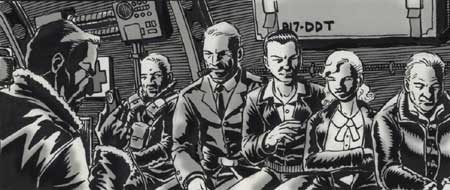
Page 4 of 6 |
|
Time passed. In Manchuria, the Kwangtung Army was defeated by Russia, which had entered the war against Japan in February of '46. The British, with American help, retook Burma, Rangoon, and other Crown possessions. China nibbled at the Japanese forces on the Asian mainland, then began to rip away great chunks after the death of Mao, and the union that followed under Chiang Kai-shek. In the pacific, the Allies, led by the United States, pursued mopping up operations. By 1950, Japan was truly isolated. Then, in 1952, Congress passed the McCarthy-Nixon Bill, popularly known as the Open Season Act. Japan was thus exposed to indiscriminate bombing by any Allied nation. That's about where Bong and his B-29 came in. As a result of an inflight systems failure, he'd lost a B-35 and parts of himself in a fiery crash on the Asian coast. After that, the Air Force couldn't use him anymore. So Bong got a plane of his own -- more or less stole the bomber from Paraguay, which in turn had received it from the United States in a foreign aid package. By no accident, both pilot and plane wound up in Bolivia, a nation less than enamored of her neighbor, Paraguay. So the obsolete (by U.S.A.F. standards) B-29, with a picture of an angry Donald Duck on its side, became a part of the Bolivian Air Force. Technically, at least. Actually, it was more of a partnership. Bong kept title to the bomber, but flew it for Bolivia's generals. Bolivia, like just about every country that went after American foreign aid, had been at war with Japan for years. On paper, anyway. But now she found herself able to actually participate. Thus, out of national pride and hopes for a bigger piece of American pie, was born the Bolivian Air Expeditionary Force: just one plane and one pilot, both on the downhill side of life. Even so modest an enterprise as BAEP proved expensive for a nation so poor as Bolivia. As always, American aid helped. But it was Estenssoro who hit on the idea of chartering the bomber and taking on tourist-observers at a stiff price. The U.S. Air Force had frowned, muttered darkly, but in the end looked the other way. Bombs were still bombs, after all, whether dropped by a big power, a backwater like Bolivia, or an individual looking for revenge. Colonel Bong's voice, a dry, cracking sound from the intercom, draws my thoughts from the past back to the immediate. He announces our target -- a village, a small one, the kind you'll not find on even the best maps of Japan. Nestled in a picturesque valley, it has somehow escaped total destruction. Some buildings are still standing. There may even be a few people, Bong tells us. We bank, begin our bombing run from the west. That means we're flying into the two hundred mile per hour wind that blows up here, more than a mile above the Jap islands. It cuts our air speed to a scant hundred miles per hour. Such a sacrifice of speed would have been more than risky in the old days. The Kamikaze Corpse was still flying then. But the last Jap plane seen was a Hayabusas, and that was back in '50. The village is a sitting duck. We come in slowly. Lieutenant Baptista, the bombardier, has all the time he needs. Jackson and Doran glue themselves to the view-ports, waiting for the really big show. It begins. The bombs fall, big five hundred pounders, a whole stream of seventy pound MA7A2 incendiaries. Craters yawn in the dusty street. Lapboard, timbers, mud cement, tile roofing, bamboo lath -- everything burns with the white fierceness of magnesium, twisting up and out through boiling smoke and licking flames. "That place sure won't be worth bombing again," Ernie says from behind a camera. Jackson chomps on his cigar and looks proud. VFW Post 1392 invested well. Old buddies are avenged. Doran is less well pleased. The show was good. Not great. And for Doran, the son of a wealthy and indulgent father, good is never good enough. Doran always buys prime. The blonde at his side is proof enough of that. "Shit! I wanted to see someone down there when it happened," whines Doran. "Can't have everything," replies Jackson, shrugging philosophically. The blonde, like old Taves, hasn't bothered to watch the village go up. Now she's got tears in her eyes, but Doran is too preoccupied to notice. Maybe I'll just give her a nice shoulder to cry on, once we're back on Saipan. Bong brings the ship around for the benefit of Ernie's color camera and our two vampires. Jackson seems to fix the blazing tableau in his memory. He'll have to make a speech when he gets back to Oklahoma City, and his buddies at the post'll want it to he accurate as well as vivid. Doran has no such responsibilities, and on top of that, he's getting bored. He slumps into a seat, leans back. His duck tail leaves a smear of grease against the bulkhead. We swing south. Laurel and birch trees hide the burning village, but not the smoke as it climbs the empty blue sky like a black staircase. I yawn; it's gonna be a long trip back. The radio makes a sound like someone tearing the cellophane off a cigarette pack, and Bong speaks, a strange quality in his already eerie voice. We've just received an unconfirmed broadcast, he says, via Radio Peking. We all listen, waiting, as the colonel's voice hesitates. Apparently, we're to receive bad news. But what bad news, we wonder, can come out of Nationalist China? When Bong finally does speak, he surprises us all. "Gentlemen, Miss-- Japan has surrendered." |
|
| Back | |
